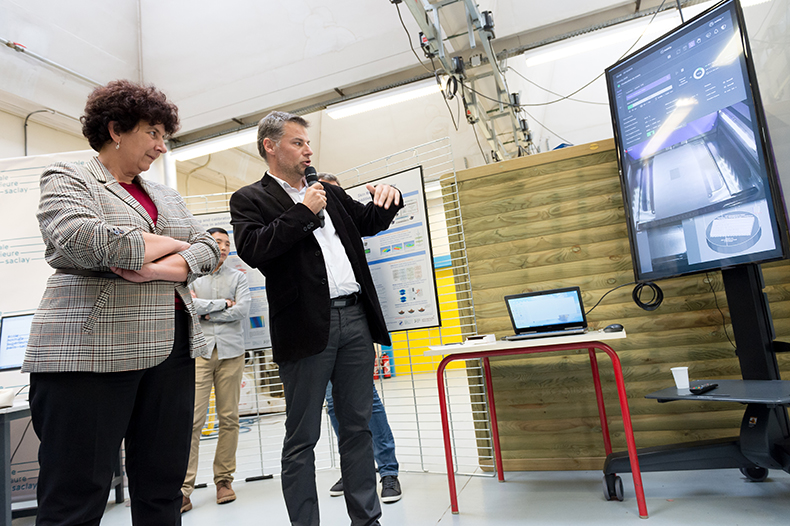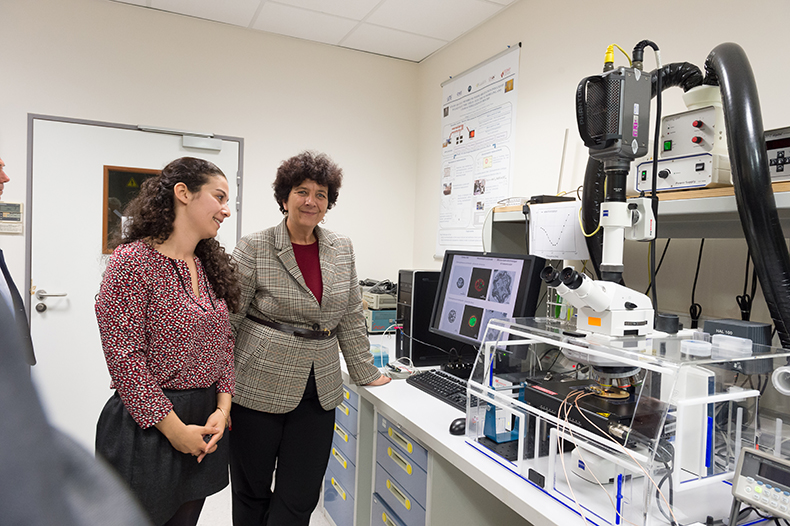Frédérique Vidal visits ENS Paris-Saclay laboratories

Ms. Vidal spoke of the founding principles of research in France, her support for fundamental research and the need to mobilize researchers and build partnerships between institutions in order to address major societal challenges.
Social science research: one of the finest professions in the world
The first meeting with the minister focused on the field of humanities and social sciences. A number of academics presented the range of subjects studied at ENS and MSH Paris-Saclay in law, history, economics and social sciences, and economics and management. The need for strong visibility in economics was discussed in relation to the new site-based policy for higher education and research groupings. André Torre, a researcher at INRA and MSH Paris-Saclay's new director, presented the mission of this social science institute, which was founded in 2015 to bring together the 1,200 social science and humanities researchers from Université Paris-Saclay's 37 laboratories and facilitate collaboration between them.
Ms. Vidal stressed that to provide students with the best possible conditions and support in these disciplines, administrative cooperation between institutions is essential. “Students must not be affected by the difficulties involved in institutions being grouped together. Offering students research-led teaching requires joint efforts between institutions and that's the whole purpose of the site-based policy,” she said.
Focus on FAPS Paris-Saclay, a revolutionary facility for industry

The minister also visited FAPS (Fabrication Additive Paris-Saclay), LURPA’s new additive manufacturing facility (ENS Paris-Saclay/Université Paris Sud). This new technology makes it possible to create complex shapes for industry through computer-aided manufacturing processes in which layer upon layer of material is added together. LURPA Director Christophe Tournier and his team presented the Selective Laser Melting (SLM) machine, which is installed on the Cachan campus until the school moves to the Paris-Saclay urban campus in 2019. The machine is an object of research in itself, but will serve students as well as researchers through introduction-to-research activities.
Microalgae for energy production

Visit of the D'Alembert Institute/SATIE Laboratory. Presentation of a method for extracting energy-rich lipid compounds produced by cultured microalgae
The D’Alembert Institute (IDA) welcomed the opportunity afforded by the minister’s visit to showcase its basic and applied research activities. IDA, a multidisciplinary research institute made up of four research labs, specializes in the electrical and photonic imaging of living organisms using nanotechnology, microfluidics and innovative photonic approaches. For the minister’s visit, Sakina Bensalem, a doctoral student in the third year of her PhD research at the institute, presented a method for pretreating microalgae to facilitate the extraction of lipid compounds. These lipid compounds can then be converted into biofuel. “Microalgae are a promising alternative to fossil fuels. The lipids they produce are required for the production of biofuels,” she explained. She also presented a method for characterizing lipid content by observing the rotational speed of the microalgae in a rotating electric field.
This multidisciplinary research project is conducted jointly by the D'Alembert Institute (SATIE laboratory) and Centrale Supelec's LGPM, and combines microfluidics, cell biology and process engineering. It comprises both basic research—with the study of the phenomena involved in lipid extraction at the cellular level—and a focus on potential applications for the bioenergy industry. The project also has an international dimension with NTHU (National Tsing Hua University), NTU (National Taiwan University) and Tokyo University.
A strong political commitment to research in France
“You have shown how the advancement of knowledge is one of the essential foundations of our society,” said Ms. Vidal. In a speech at the end of her visit, the minister recalled the main founding principles of research in France and her political commitment to it. “It is our responsibility to show just how essential research and the dissemination of knowledge and of the scientific approach are. The scientific community must be mobilized to give our young people a future and to establish a pact of trust with citizens to combat obscurantism.”
The minister wishes to strengthen her support for basic research with an 8% increase in the research budget in 2019 (in addition to the Grand Investment Plan funding), with funds of around €6.9 billion. This commitment translates into a €25 million support measure for laboratory subsidies, including €5 million for the humanities and social sciences. Payment appropriations for the French National Research Agency are to increase by 34.4% (up €33 million) in 2019 to support universities’ and research organizations’ most promising projects.
Photos : Alfonso Rodriguez - ENS Paris-Saclay
